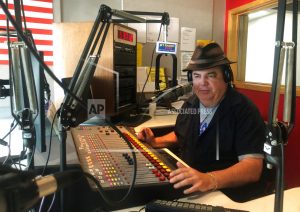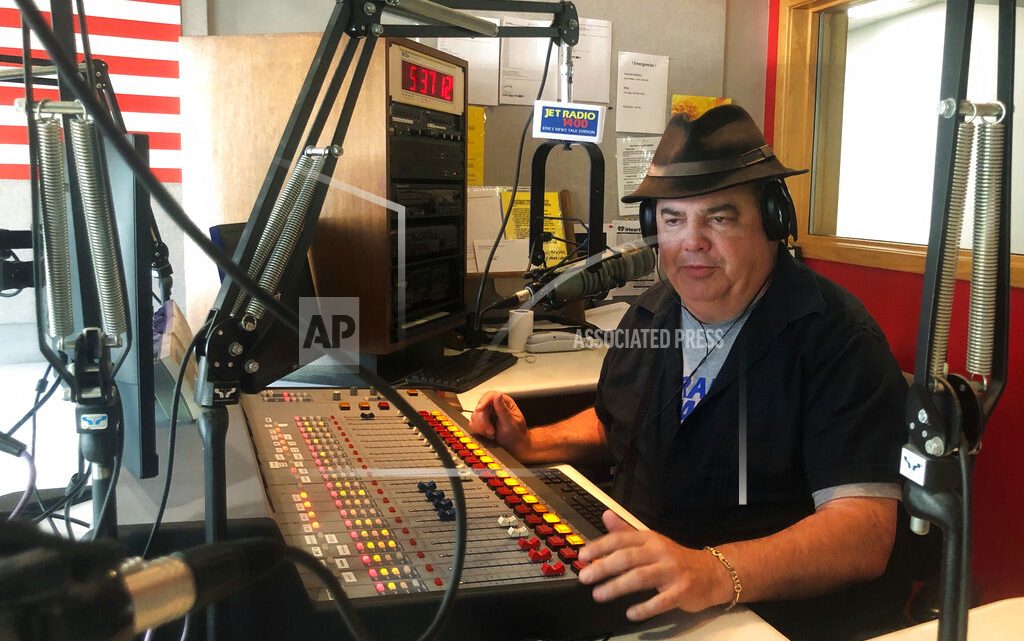Trump’s America: Where politics dictate ‘racism’ definition
By CLAIRE GALOFARO and BILL BARROW Associated Press
ERIE, Pa. (AP) — It was the last morning of the workweek, and Scott Bremner, a popular talk-radio host, found himself — again — in the role of accidental referee on the issue of race.
And again, the discussion was inspired by racial provocations from President Donald Trump. For one caller, critics of Trump had things upside-down.
“We’re getting angry again, and I’m telling you we’re going to step up again and vote for Trump,” the caller said, “because we are not racist, Trump is not a racist, and you guys are fomenting this stuff.”
Before Bremner could respond, the man hung up. “Make your point and run,” Bremner said. “That’s a good way to have a discussion.” Yet that is the way many Americans seem to be discussing the nation’s roiling racial discord.

Scott Bremner, talk radio host, works in Erie, Pa. Months ago, Bremner had tried to establish if his listeners could agree on a fundamental question: what is racism? The answer, he realized, is no, we don’t even agree on that. (AP Photo/Claire Galofaro)
The next morning, a young man 2,000 miles away posted a hateful, anti-immigrant screed on the internet, walked into a Walmart in El Paso, Texas, with a gun and shot 22 people dead. By the time Bremner signed on again on Monday morning, another man with a gun had stormed an entertainment district in Dayton, Ohio, killing nine, though his motive remains unknown.
Bremner’s show carries just one current of the heated national debate on race that has been fanned by Trump’s unrepentant use of white identity politics and inflamed by white supremacist violence like the shooting in El Paso. In interviews with The Associated Press across a half-dozen states, voters see a country riven by racial animus — better than a generation ago, but worse than before Trump’s presidency, with little choice but to confront the long struggle anew.
Months ago, Bremner, who considers himself a moderate, tried to establish whether his listeners could agree on a fundamental question: What is racism? The answer, he realized, is no, they don’t even agree on that.
Racial and ethnic polarization has been a hallmark of Trump’s political career. He’s warned of an “invasion” at the southern border and attacked Democratic Rep. Elijah Cummings’ largely black district as a “rat and rodent infested mess.” Trump needs to maximize support from white voters in places like Erie County, which chose President Barack Obama twice, then flipped for Trump and helped narrowly deliver him the key state of Pennsylvania.
Jim Noland, who lives in a rural town near Erie, cheers Trump on. Through Nolan’s lens, Trump’s messages aren’t racist, they’re truth.
“Before, you just wouldn’t disagree with (Democrats) because you were afraid of being called a racist,” he said. “And now, you disagree with them because their ideas are bad, and that’s enough. When they call you a racist back, you can laugh.”
He dismissed any link between Trump’s rhetoric and the El Paso shooting suspect’s manifesto.
Lucinda Rodriguez, the daughter of a Mexican immigrant, has a colleague who was killed and a friend who was wounded by the El Paso gunfire. Rodriguez said the killings affirm for her a rising hatred toward Latinos. Yet Trump’s rhetoric, she said, didn’t load any gun or pull any trigger.
At a vigil mourning those killed in Dayton, attendees echoed that reluctance to assign fault to the president. A 74-year-old black woman, Rickie Myles, said she’s increasingly fearful amid an environment where “people spew hate” with ease. But Myles sees no way to understand his motives.
Away from the visceral responses of El Paso and Dayton, the response has largely cleaved along politically polarized lines.
Talina Massey in New Bern, North Carolina, has little problem steering responsibility to the Oval Office and an occupant she sees as deliberately indulging the worst human instincts.
“It’s not a matter of party lines anymore,” said the black 35-year-old retired Marine. “It’s a matter of good vs. evil, the ultimate conflict.”
A couple of months ago, a young white man, D.J. Smith, wandered into a Democratic political meeting in Erie and said he was sorry. He voted for Trump because he’d always been Republican, hadn’t paid much attention to politics and never thought much about race.
But then suddenly he did. It occurred to him that he had not needed to pay heed before because he was white and male and the country generally worked in his favor.
“I had an ‘Am I the bad guy?’ moment. I realized that I was, and I started to open up my eyes,” the 29-year-old said. He probably made racist jokes in the past, he thought, and said insensitive things.
He was consumed by remorse for voting for a man who exploits Americans’ ugliest impulses for political gain. Smith quit his job. He could not conceive of going on as normal as the nation convulses, he said, and started searching for a way to help bring the county back together.
___
Barrow reported from Atlanta. Associated Press writers Morgan Lee and Astrid Galván in El Paso, Texas; John Seewer in Dayton, Ohio; and Martha Waggoner in Raleigh, North Carolina, contributed to this report.
___
Follow the writers on Twitter at https://twitter.com/clairegalofaro and https://twitter.com/BillBarrowAP .



No Comment